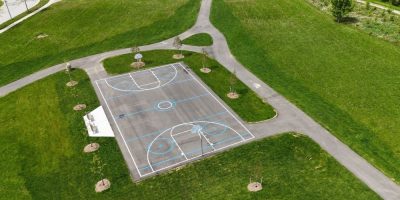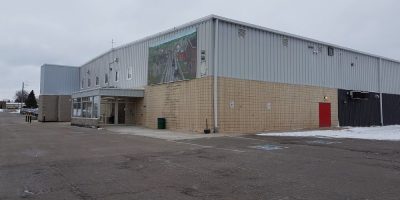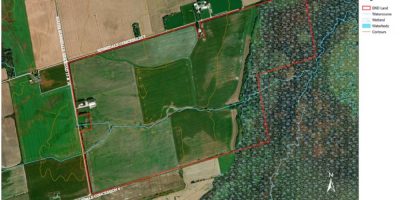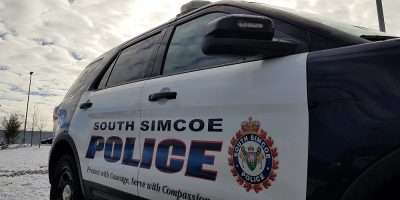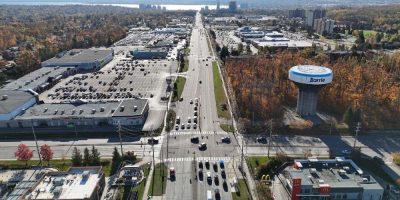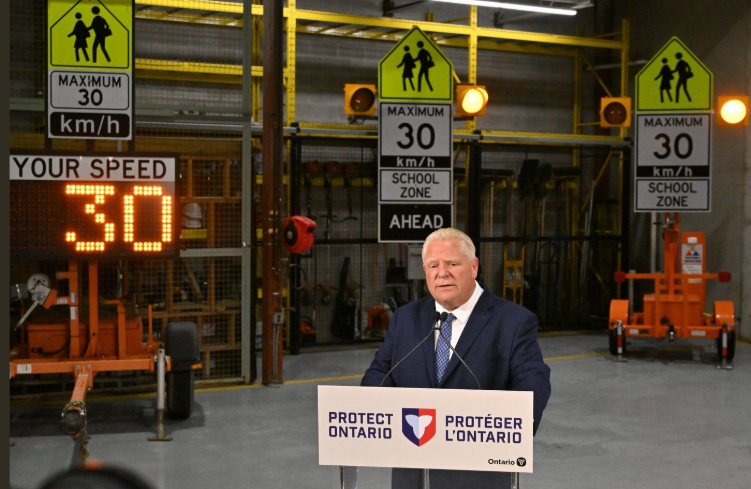
Several Ontario municipalities are pushing back on Premier Doug Ford's planned speed camera ban, urging him to tweak the program instead of outright cancelling it — but if he forges ahead, they say the province should foot the bill.
Ford has announced that his government will introduce legislation this month to prohibit the use of speed cameras across the province.
The premier calls the cameras a "cash grab" and has criticized several parameters of the program his government put in place. A letter this week to Ford and Transportation Minister Prabmeet Sarkaria from 22 mayors, including Innisfil Mayor Lynn Dollin, calls on the government to make a few simple changes to the program rather than scrapping it entirely.
"A total ban on (automated speed enforcement) would reverse years of progress on safety in school zones," write the mayors, including several who are otherwise supportive of the Ford government.
"It would place more pressure on police, increase enforcement costs, and most critically, endanger lives."
However, if the province intends on banning all of those cameras, even ones in school zones, it should fully reimburse municipalities for lost revenues that were being used for traffic calming, staff severance costs and increases in municipal policing costs, the mayors write.
Staff in several municipalities are in the process of calculating those costs and plan to send that bill to the province.
The government has said municipalities will be encouraged to instead use speed bumps, raised crosswalks and roundabouts to slow traffic. Ford said there would be a new fund to help offset some of those costs but couldn't provide an amount for it. The premier's office says the province "will look to indemnify municipalities from contractual obligations" related to the cancelled cameras.
Burlington Mayor Marianne Meed Ward, one of the top signatories to the letter, said her city has already spent several hundred thousand dollars for six speed cameras that were about to be installed. Since the cameras have not yet had a chance to issue fines, the city has not recouped any of its costs.
It also has not had a chance to put any fine revenue toward other traffic safety measures, as planned, so now all taxpayers will have to pay for that instead of the speeders, she said.
"I hope that reason and evidence and ultimately public safety…prevails," Meed Ward said in an interview.
"Our letter is really our plea. It’s an SOS to the premier. A 'save our schoolkids.' When you get hit by a car at 30 (kilometres per hour) you have a chance of surviving that. When the speeds go to 40 or 50, your chances of surviving that impact drop dramatically."
Barrie's News Delivered To Your Inbox
By submitting this form, you are consenting to receive marketing emails from: Central Ontario Broadcasting, 431 Huronia Rd, Barrie, Ontario, CA, https://www.cobroadcasting.com. You can revoke your consent to receive emails at any time by using the SafeUnsubscribe® link, found at the bottom of every email. Emails are serviced by Constant Contact
The premier has criticized some cities for putting speed cameras outside school zones. So change the rules to limit the cameras to school zones, the mayors suggest.
The premier has said some drivers get dinged for going "a few" kilometres per hour over the limit. So dictate a higher threshold, the mayors suggest.
Ford maintains that the cameras don't work, despite a large amount of evidence to the contrary.
The Ontario Association of Chiefs of Police says the cameras work and free up police to focus on other public safety priorities. A July study from the Hospital for Sick Children and Toronto Metropolitan University found the cameras reduced speeding by 45 per cent in Toronto.
Data show that in Brampton and Mississauga, traffic slowed down nine kilometres per hour, on average, across their camera locations. Five locations in Brampton saw reductions of more than 20 kilometres per hour. Preliminary data in Newmarket show an average decrease of 10 kilometres per hour. Niagara Region saw average speed reductions of seven kilometres per hour.
In Vaughan, which recently decided to end its short-lived speed camera program, staff reported that driving speeds were reduced at all 10 camera locations, including one that saw speeds drop by an average of 23 kilometres per hour.
Ford believes traffic can be slowed down through alternate measures such as large signs with flashing lights, which the province will require in place of cameras currently in use in school zones.
A Vaughan staff report from before the city ended its camera program shows they contemplated a number of measures to enhance public awareness and warn drivers of speed camera locations, including putting flashing lights on the "municipal speed camera in use" signs, but they said that was not allowed by the province.
Newmarket Mayor John Taylor said at a recent York regional council meeting that municipalities have tried many of the other tools cited by the premier.
"Please don’t talk to me about flashing signs and speed humps," he said.
"We’ve been there and done that for decades. We know what truly works, what truly is effective and that’s speed cameras...We’re going to lose the greatest municipal safety tool we’ve ever had, and that’s a shame."
Barrie City Council, at its meeting on September 24, directed staff to begin phasing out the Automated Speed Enforcement (ASE) program. This is supposed to happen at the end of the year.
Until then, existing cameras will remain in operation
The city has said that all funds from the ASE program are used to fund safety and traffic calming initiatives.
At the same meeting, council gave the green light to consider red-light cameras, which capture images of vehicles entering an intersection after the traffic signal has turned red. Staff will report back to city council before a red light camera is implemented.
In 2016, the city studied three busy intersections and found that there were about three red light infractions per day at those intersections.
Recent traffic data management shows infractions have increased.
"Mapleview Drive West going southbound in the southbound ramp, we're looking at a 72-hour period of 135 (red-light infractions). That ended up being like five per hour, versus what we used to see, three per day. The northbound ramp is about four per hour, and Bayfield and Livingstone is about seven per hour. The preliminary data that we have coming in is showing much higher rates," Barrie's director of development services, Michaelle Banfield, revealed to councillors at their September 24 meeting.
This report by The Canadian Press was first published Oct. 3, 2025.
Files from Barrie 360
